Key Takeaways:
- In 2000, Elysium chief scientist Leonard Guarente, Ph.D., discovered that a family of proteins called sirtuins control aging in yeast—and that sirtuins require NAD+.
- In 2013, researchers confirmed that levels of NAD+ decline with age in human tissues, and they hypothesize that the decline plays a role in aging.
- In 2015, Elysium launched Basis to reverse the age-related decline in NAD+.
Related Products:
- Basis: Contains the NAD+ precursor NR and pterostilbene and is clinically proven to boost NAD+ levels by 40%. The ingredients in Basis work synergistically to target cellular aging and maintain healthy DNA.
Elysium launched Basis in 2015, our first product aimed at unlocking the potential of longevity science from research institutions so our customers can unlock their healthiest lives possible. But great research takes time, and the scientific discoveries that led to Basis date back more than a century to the discovery of NAD+. Along the way, our chief scientist Leonard Guarente, Ph.D., made seminal contributions to longevity science and in particular to NAD+ and sirtuin biology. These laid the direct foundation for Basis, which targets cellular aging by increasing levels of NAD+. Today, Elysium continues partnering with the world’s leading scientists and institutions to drive NAD+ research, and longevity science, forward.
16th Century
A Venetian nobleman Luigi Cornaro adopts a calorie-restricted diet at age 35 to address his failing health. He is the first person to promote calorie restriction as a means of prolonging life. Records indicate that his restricted diet cures him of all of his ailments in less than a year, and he lives to be 102 years old.
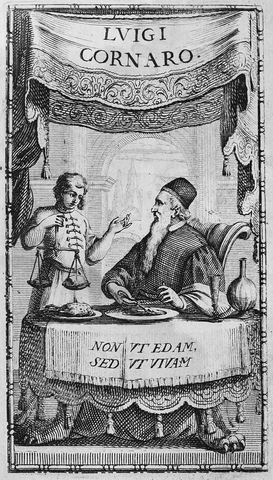
1906
British biochemists Arthur Harden and William John Young discover NAD+ as a component ("coferment") that could increase the fermentation rate in yeast.
“This reaction is only realized in the presence of ferment and coferment…”
1929
Harden and Hans von Euler-Chelpin win the Nobel Prize in chemistry for their work on fermentation after determining that it requires the presence of an enzyme (“zymase,” actually a mixture of enzymes) and a coenzyme which they call “cozymase,” now known as NAD+.
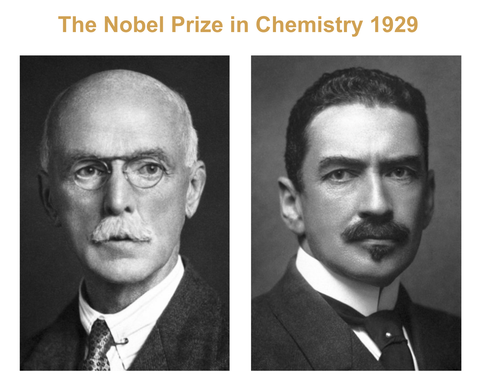
Later studies would reveal NAD+ as an important coenzyme involved in oxidation–reduction reactions necessary for oxidative phosphorylation and ATP (cellular energy) production.
1935
McCay, Crowell, and Maynard publish “The Effect of Retarded Growth upon the Length of Life Span and upon the Ultimate Body Size” in The Journal of Nutrition, the first paper to show that the restriction of calories without malnutrition prolongs mean and maximal lifespan in rats compared with ad libitum feeding.
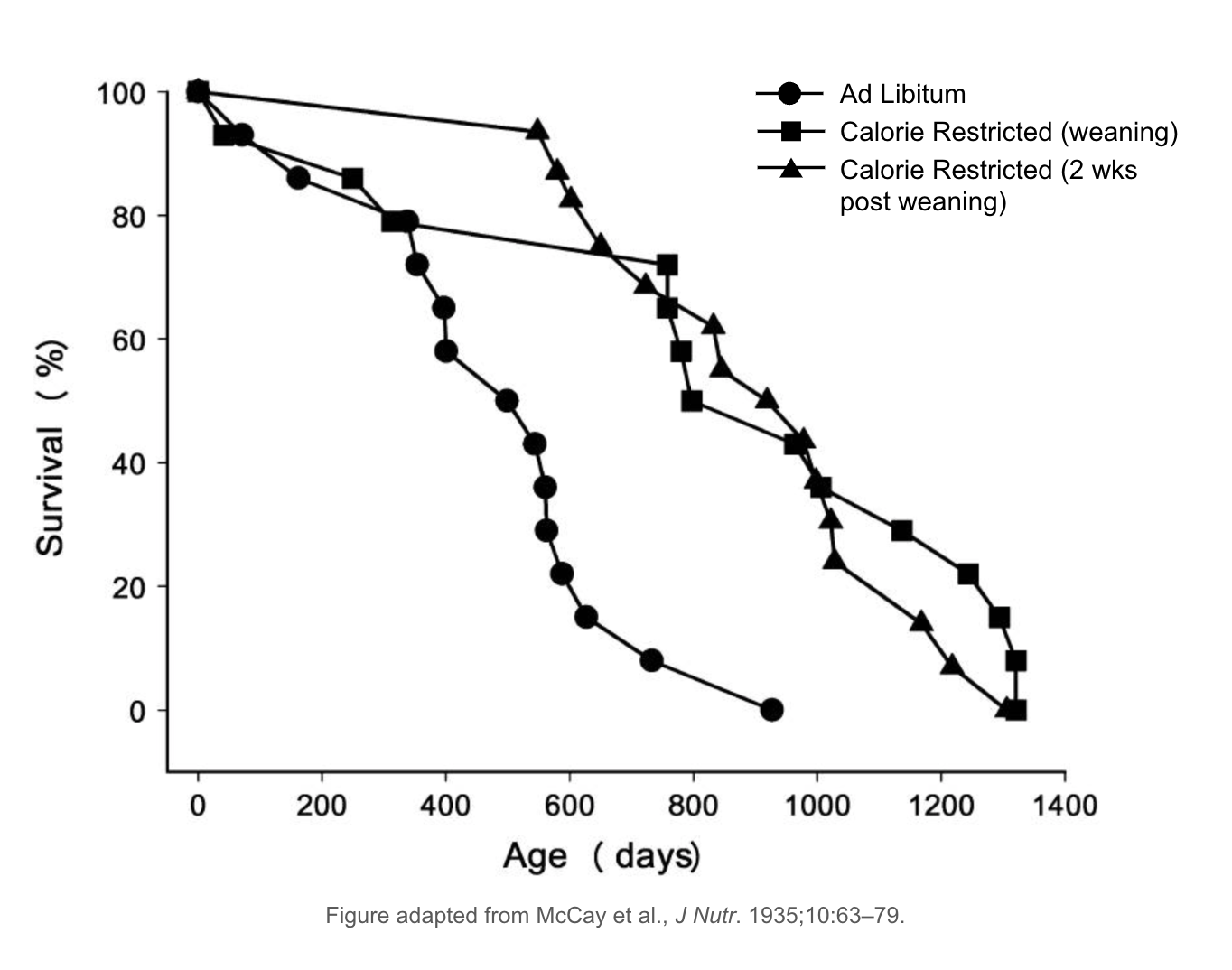
1937
Conrad Elvehjem discovers that pellagra is caused by a deficiency of niacin, a form of B vitamin and a precursor of NAD+. Pellagra had become an epidemic in the American South in the early 1900s, a fatal disease characterized by dermatitis, diarrhea, and dementia. Decades earlier, a doctor named Joseph Goldberger, appointed by the U.S. surgeon general to tackle the pellagra crisis, discovers an important link between nutritional deficiency and the disease. It isn’t until after his death, however, that Elvehjem identifies niacin (also known as nicotinic acid) as the missing nutrient. Pellagra rates drop sharply after the passage of state laws in the 1940s mandating that bread and grains be enriched with niacin.
1977
While earning his Ph.D. at Harvard University, Leonard Guarente publishes his first paper in the Journal of Molecular Biology.
1980
The New England Journal of Medicine runs a landmark article by Stanford’s professor of medicine Jim Fries, a healthy aging pioneer. He reviews the state of healthcare and concludes we can compress morbidity and reduce spending by taking a proactive approach to health.
1991
Dr. Guarente, now at MIT, devotes his career to the study of aging research. Although he’s advised against focusing his research on aging, he predicts that intervening in aging to sustain youthful health will be a reality.
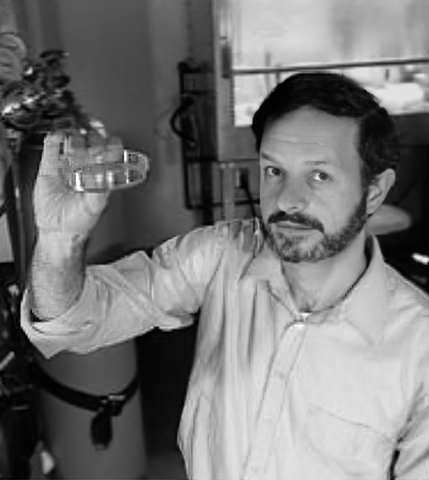
1995
Dr. Guarente and his lab members discover that a family of proteins called sirtuins control aging in yeast. His first paper on sirtuins is published in the journal Cell.
1999
Dr. Guarente and his team begin to uncover insights into how sirtuins promote longevity in yeast.
2000
Dr. Guarente’s team discovers that SIR2, a yeast sirtuin, is a NAD-dependent histone deacetylase, connecting sirtuins to NAD+ in what may be the most important finding in the arc of sirtuin biology. “These findings provide a molecular framework of NAD-dependent histone deacetylation that connects metabolism, genomic silencing and ageing in yeast and, perhaps, in higher eukaryotes,” he writes. In other words, without NAD+, SIR2 does nothing. His seminal paper is published in Nature.
“These findings provide a molecular framework of NAD-dependent histone deacetylation that connects metabolism, genomic silencing and ageing in yeast and, perhaps, in higher eukaryotes.”
2001
Dr. Guarente and his team provide evidence suggesting sirtuins may play a role in longevity in higher model organisms.
2003
Polyphenolic natural compounds such as pterostilbene and resveratrol are found to be sirtuin activators. While researchers are initially focused on resveratrol, over time they find that it isn’t very bioavailable. They shift their focus to pterostilbene, which is similar to resveratrol but with one tiny but crucial structural difference: It has just one hydroxyl group, compared to resveratrol's three. Pterostilbene's slightly different molecular structure allows it to cross cell membranes more easily and stay in the body longer than resveratrol.
2012
Researchers confirm that levels of NAD+ decline with age in human tissues, a finding that will be repeated in multiple studies. “The resulting NAD+ depletion may play a major role in the aging process, by limiting energy production, DNA repair and genomic signaling,” the authors write.
“The resulting NAD+ depletion may play a major role in the aging process, by limiting energy production, DNA repair and genomic signaling,”
By middle age, our NAD+ levels decline by approximately 50%.
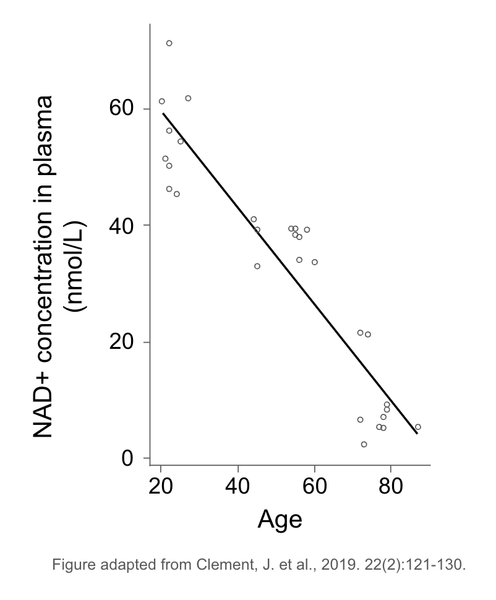
That same year, researchers restore NAD+ levels in mice and mammalian cells for the first time with the precursor nicotinamide riboside (NR). They find that NR increases NAD+ levels and activates sirtuins 1 and 3, enhancing oxidative metabolism and offering cellular health benefits. This lays the groundwork for using NR as a nutritional supplement for healthy aging.
2013
An important study in Cell finds that declining NAD+ disrupts cellular health and nuclear-mitochondrial communication during aging. The authors conclude that this contributes to the decline in mitochondrial function with age—and that the process may be reversible.
2014
Elysium Health is established with its headquarters in New York City, founded by Eric Marcotulli, Dan Alminana, and Leonard Guarente, Ph.D., director of The Paul F. Glenn Center for Biology of Aging Research at MIT. The company moves quickly to become the leader in helping people access, understand, and benefit from scientific breakthroughs in longevity. Unparalleled depth of scientific expertise sets Elysium apart, with a Scientific Advisory Board that will grow to include 25+ pioneers in science and medicine, among them eight winners of the Nobel Prize.
2015
Elysium launches its first product, Basis, developed by Dr. Guarente. Basis targets aging at the source—the cells—by raising levels of NAD+, a coenzyme essential for fundamental biological functions, including ATP synthesis, the source of cellular energy. Basis promotes cellular energy, protects DNA from stressors, supports collagen and ceramide synthesis for healthy skin, and supports healthy muscle function.
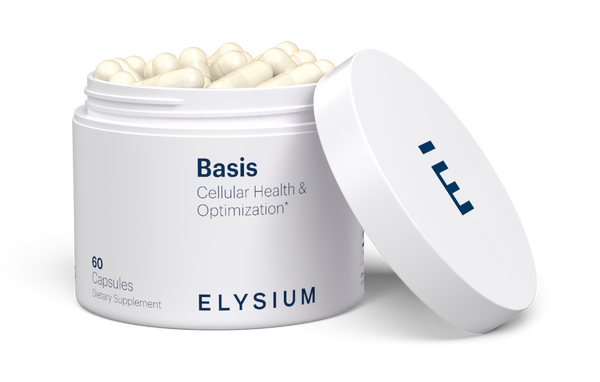
2016
Elysium’s first human clinical trial is completed, demonstrating that a daily dose of Basis safely and sustainably increases NAD+ levels by an average of 40% from baseline. The study is published in Nature Partner Journals: Aging and Mechanisms of Disease.
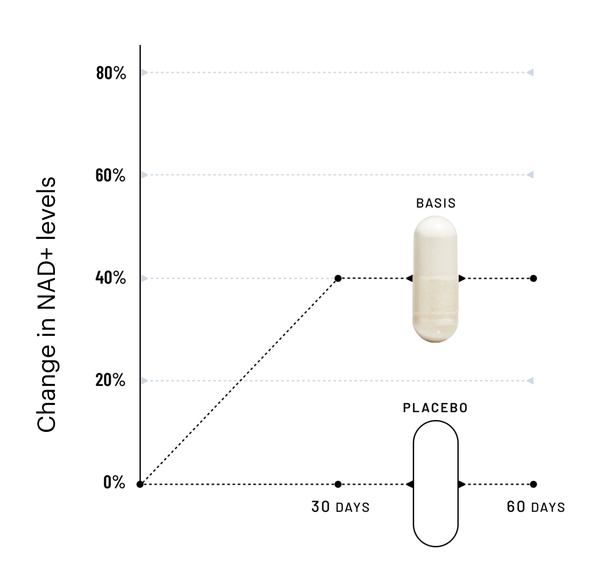
Elysium enters into multi-year research agreements with leading academic institutes to fulfill its mission of solving the biggest challenges in health.
2018
Elysium receives the first-ever Good Housekeeping Innovation Emblem for its product Basis. This seal recognizes trailblazing research, initiatives, products, and organizations that push boundaries and raise the bar for both consumers and the health and wellness industry.
Basis becomes NSF International Certified for Sport. The rigorous evaluation process assesses numerous quality components to confirm that products do not contain any of approximately 270+ substances banned by major athletic organizations. NSF Certified for Sport products are tested on an ongoing basis to confirm that each lot is not only free of banned substances, but also that the contents of the product match the label claims, and that it is manufactured at a facility that is GMP registered and audited twice annually for quality and safety by NSF International. In addition to assessments conducted by NSF International, every lot of Basis undergoes rigorous third-party testing to ensure it exceeds quality and purity standards set by the International Conference on Harmonisation (ICH) and adopted by the FDA for dietary supplements.
2021
In collaboration with the University of Copenhagen and funded by a grant from the Danish government, Elysium completes a human clinical trial evaluating the effect of Elysium’s proprietary nicotinamide riboside (NR-E) on clinical outcomes in elderly patients with COPD. The study results, which are in pre-print as of early 2024, show that NR-E supplementation supported a healthy inflammation response in the lungs.
Working in partnership with the University of South Alabama, Elysium completes a pilot study evaluating the effects of Basis supplementation on menopausal syndromes. The study is pending publication.
2022
NAD+ abundance and healthy aging go hand-in-hand, according to research published in Nature Aging. The authors write: “Our work suggests that a clear association exists between NAD+ and health status in human aging.”
“Our work suggests that a clear association exists between NAD+ and health status in human aging.”
Elysium completes the Slow Aging clinical trial initiated at the University of Copenhagen in Denmark. This human clinical trial evaluated the effects of nicotinamide riboside (NR-E), aerobic exercise, or time-restricted feeding on markers of aging. The study is pending publication.
2023
A study published in Aging Cell reports that modest caloric restriction supports healthy aging in humans. Researchers find that a 12% reduction in daily caloric intake over two years led to improved muscle health and upregulated pathways associated with longevity. The study provides strong evidence that calorie restriction works via the NAD+/sirtuin pathway in humans, just like in mice and other organisms.
“...the sirtuin pathway [is one of] the top biological mechanisms targeted by calorie restriction.”
Elysium publishes the results of a six-month human clinical trial showing that Basis, at the recommended dose, reduced several markers of liver inflammation in healthy adults with fatty liver. The results, published in Hepatology, also further confirmed that Basis is safe and well tolerated and supports liver function in healthy individuals.
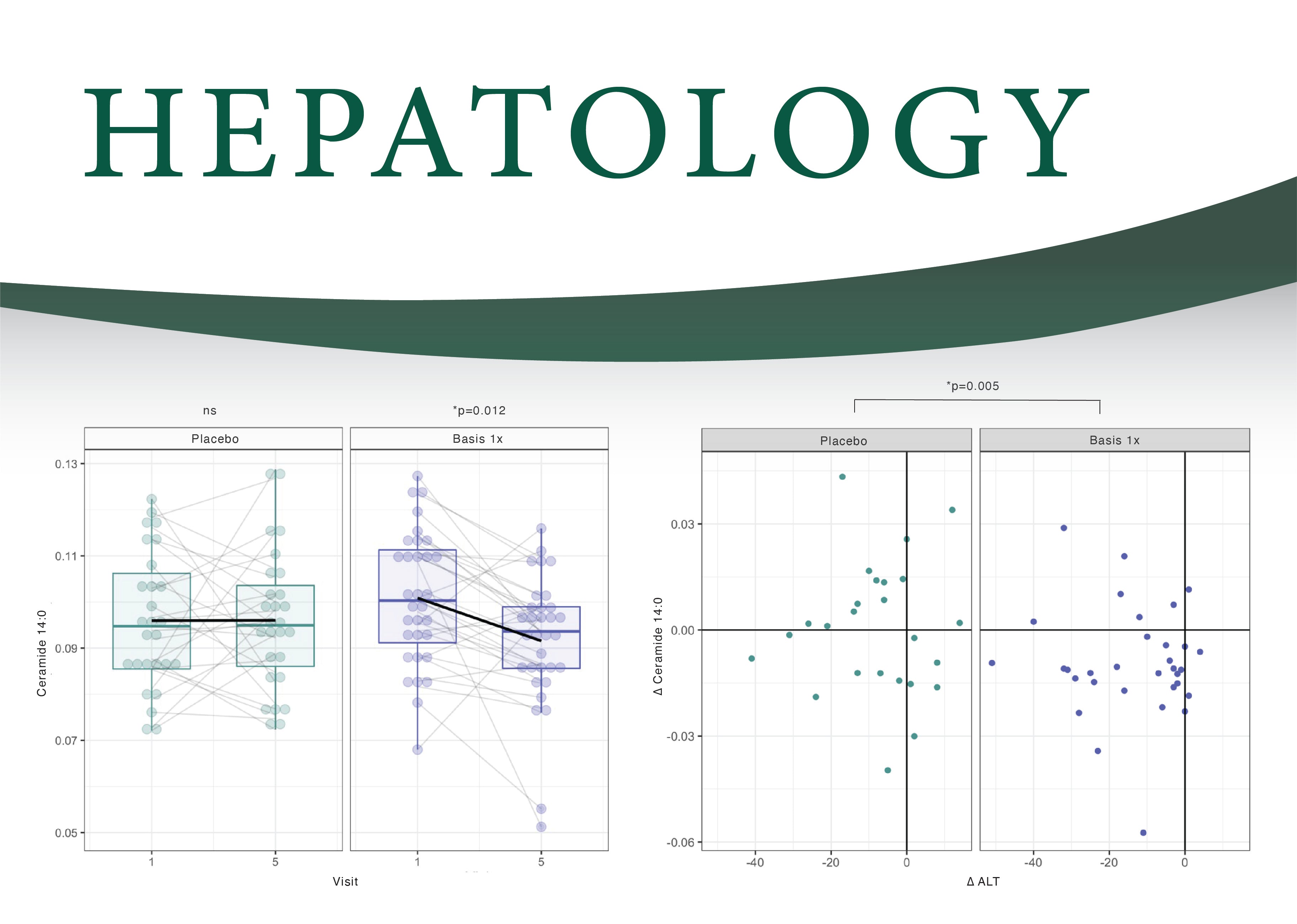
The landmark “hallmarks of aging” study published in 2013 gets an update to include disabled macroautophagy, chronic inflammation, and dysbiosis, along with nine other molecular, cellular, and systemic drivers of aging. The authors explain in detail how the hallmarks are integrated, and use “sirtuin activators including NAD+ precursors” as an example of interventions that simultaneously target multiple hallmarks.
2024
Initiated at Mayo Clinic, this human clinical trial is evaluating whether Elysium’s proprietary nicotinamide riboside (NR-E) can augment bone, skeletal muscle, and metabolic functions and structure in aging. The estimated primary study completion date is March 2024.
2027
Initiated at the University of Oklahoma, this human clinical trial is evaluating the efficacy of NR-E on supporting brain vascular health and memory in aging. The estimated primary study completion date is June 2027.
Visit https://www.elysiumhealth.com/pages/science for a more comprehensive list of clinical trials on NR.




